Litóhoro, Pieria, Greece, Tuesday afternoon, 19 September 2000
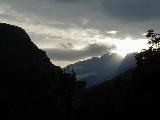
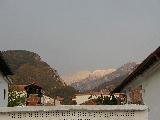
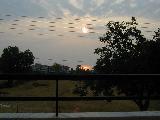 After moving in here we spent just over a week without even leaving the town. We began to learn the stores and their hours, finding which had the best of what, when they were open, how best to get there on foot, etc., as well as arranging and supplying the kitchen and the apartment in general. We also learned that while the cleft summit of Olympus can look dramatic when back-lit in evening (far left), generally the clearest views are to be seen in the morning (near left, from Livithron Street just around the corner), shortly after the sun rises out over the Thermaic Gulf (right, again from our front balcony), and before it gets too hazy.
After moving in here we spent just over a week without even leaving the town. We began to learn the stores and their hours, finding which had the best of what, when they were open, how best to get there on foot, etc., as well as arranging and supplying the kitchen and the apartment in general. We also learned that while the cleft summit of Olympus can look dramatic when back-lit in evening (far left), generally the clearest views are to be seen in the morning (near left, from Livithron Street just around the corner), shortly after the sun rises out over the Thermaic Gulf (right, again from our front balcony), and before it gets too hazy.
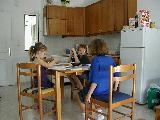 Mornings Monday through Friday are given over to the home school. The children have been learning the modern Greek alphabet along with their regular reading, writing, and arithmetic. I have begun one of my writing projects, though I am hampered in the main one by the unexpected absence of a box full of papers that I had mailed on ahead, and also by the lack of internet access. There are two cyber cafes in town, but I want to have dial-up access from home. We do not even have the prerequisite phone service yet, since I did not think to bring my passport with me when I first went to the telephone office on Friday the eighth, and it has been closed by a strike ever since.
Mornings Monday through Friday are given over to the home school. The children have been learning the modern Greek alphabet along with their regular reading, writing, and arithmetic. I have begun one of my writing projects, though I am hampered in the main one by the unexpected absence of a box full of papers that I had mailed on ahead, and also by the lack of internet access. There are two cyber cafes in town, but I want to have dial-up access from home. We do not even have the prerequisite phone service yet, since I did not think to bring my passport with me when I first went to the telephone office on Friday the eighth, and it has been closed by a strike ever since.
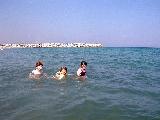 This past Friday, the fifteenth, Stas's parents Paul and Joann arrived, for a visit that is to be split across a tour of Turkey that starts in a couple of days. We took advantage of their rental car to go to a nearby pebble beach that same day. I reflected with a certain unholy glee that I was frolicking in the Aegean's blue waters barely eighteen hours after the first English Department meeting of the year back home.
This past Friday, the fifteenth, Stas's parents Paul and Joann arrived, for a visit that is to be split across a tour of Turkey that starts in a couple of days. We took advantage of their rental car to go to a nearby pebble beach that same day. I reflected with a certain unholy glee that I was frolicking in the Aegean's blue waters barely eighteen hours after the first English Department meeting of the year back home.
The next day they took us to the nearby but distinctly larger town of Kateríni. They themselves are staying in Kateríni, in an apartment belonging to his cousin Lambriní. She is one of a large sib-ship of Paul's second or third cousins, recently discovered through an internet search for persons in America sharing his rare Greek surname. Lambriní and her brother Ilías and their respective families live mostly in Pennsylvania, but the rest of the clan lives here in Macedonia.
After a little shopping in Kateríni--we got a little CD player and a bríki for making Greek-style coffee--we all proceeded to the satellite town of Paralía Katerínis ("Kateríni's Beach"), where we were overwhelmingly entertained in the front courtyard of a hotel that Lambriní's and Ilías's brother Chrysóstomos owns there. We also swam there at the rather crowded sandy beach. Chrysóstomos took me to see where he lived in Kateríni proper, and how to get there from the bus station. In a second expedition, he showed me where and at what kinds of prices we could get bicycles. (Now we think we shall live without any bicycles as well as without a car, but it was a passing thought.) Mostly, though, we just sat around having enormous quantities of rich food imperiously pressed upon us, and wishing we could understand more of the voluble Dimotikí that swirled around us.
Paul himself had the advantage of its having been his first language--his mother never spoke anything else, though she bore and raised her children in America--but even I could tell he was rusty and struggling. Among the sayings of Chrysóstomos that he and Joann translated for us in the course of the day were advice to lie about the children's ages in order to save on already cheap bus fares, and several dubious points on sea bathing: that it was somehow purifying to the system if one left the salt encrusting one's body and hair, and that the iodine content of the Thermaic gulf made for faster tanning. We also learned that the widespread apparent disregard for traffic laws was an expression of the Greeks' cherished elefthería, freedom, and we were offered free use of Chrysóstomos's apparently numerous powerful connections including "ins" with both the army and the police.
Cousins by the dozens drifted onto the scene at the hotel courtyard throughout the afternoon, occasioning a new photograph at each arrival. At one point, the party removed to yet another relative's beachfront bar, with excruciatingly loud music. Stas and I fled back to the hotel to rejoin our children, whom I suddenly discovered had been left in the sole care of their twelve-year-old cousin Chrysoúla. (She is a very nice and responsible young lady who speaks good English, and everything was fine, but I had been expecting her mother to be there too.) Shortly thereafter Paul and Joann also came back, and Paul hustled us very quickly out to the car lest Chrysóstomos return and keep the children from their beds with yet further insistent hopitality.
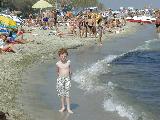 We returned to Paralía for more swimming and entertainment Sunday afternoon--gluttons for punishment, or maybe just plain gluttons. After another massive lunch, Chrysóstomos drove me on a round trip back here to Litóhoro to deliver a desk he is kindly lending us, on which I am now writing. In the evening we went to dinner in Kateríni at his sister Iríni's. There we met for the first time her daughter Elefthería, who had found us this apartment (and who speaks the best English of the whole numerous tribe, though little Chrysoúla seems to be closing on her fast).
We returned to Paralía for more swimming and entertainment Sunday afternoon--gluttons for punishment, or maybe just plain gluttons. After another massive lunch, Chrysóstomos drove me on a round trip back here to Litóhoro to deliver a desk he is kindly lending us, on which I am now writing. In the evening we went to dinner in Kateríni at his sister Iríni's. There we met for the first time her daughter Elefthería, who had found us this apartment (and who speaks the best English of the whole numerous tribe, though little Chrysoúla seems to be closing on her fast).
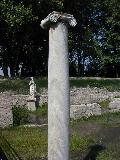
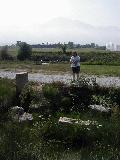 Monday after school (and as a school field trip) we went to nearby Dion, an ancient city and the site of numerous ancient sanctuaries, including a sanctuary of Zeus where Alexander sacrificed before his Asian campaign. Almost all the remains are Hellenistic or Roman in period, with the partially flooded sanctuary of the Egyptian goddess Isis (left) much the most photogenic. (Before being given over to the import, it had been sacred to Artemis in her midwife aspect, and to Aphrodite "Hypolympidia," i.e. of the Olympus foothills.) Overall we found the site distressingly opaque, with haphazard signage and no really adequate maps or guides available anywhere. One site employee when asked mis-identified the Roman theater as the Greek (Hellenistic) one. Particularly difficult to find was the little sanctuary of the healer-god Asclepius (right, with Stas and in the background the Hellenistic theater, and Mount Olympus through the usual afternoon haze). The Blue Guide and a little brochure we brought with us both mentioned this little sanctuary; and the brochure's map, though lacking a scale, allowed me to find it by triangulation once we had correctly identified both major theaters. But I searched in vain for any acknowledgement of its existence even, around the visitors' center, among the scattered signs, and even in a book I bought there about the site; and vegetation had been suffered to overwhelm the remaining stones almost entirely.
Monday after school (and as a school field trip) we went to nearby Dion, an ancient city and the site of numerous ancient sanctuaries, including a sanctuary of Zeus where Alexander sacrificed before his Asian campaign. Almost all the remains are Hellenistic or Roman in period, with the partially flooded sanctuary of the Egyptian goddess Isis (left) much the most photogenic. (Before being given over to the import, it had been sacred to Artemis in her midwife aspect, and to Aphrodite "Hypolympidia," i.e. of the Olympus foothills.) Overall we found the site distressingly opaque, with haphazard signage and no really adequate maps or guides available anywhere. One site employee when asked mis-identified the Roman theater as the Greek (Hellenistic) one. Particularly difficult to find was the little sanctuary of the healer-god Asclepius (right, with Stas and in the background the Hellenistic theater, and Mount Olympus through the usual afternoon haze). The Blue Guide and a little brochure we brought with us both mentioned this little sanctuary; and the brochure's map, though lacking a scale, allowed me to find it by triangulation once we had correctly identified both major theaters. But I searched in vain for any acknowledgement of its existence even, around the visitors' center, among the scattered signs, and even in a book I bought there about the site; and vegetation had been suffered to overwhelm the remaining stones almost entirely.
Today during school Joann made crumble with the enormous quantity of peaches that Chrysótomos had bought for us at the Kateríni market Saturday morning (while showing Paul and me the way from the bus station to his house). After lunch everyone but me went to the nearby beach. (Something about all this sea bathing has been disagreeing with my skin.) After that they were going to deliver two of the three pans of crumble to the clan, which has apparently detained them yet again. I stayed behind to do some cleaning and catch up on this journal--and here they come at last.
previous entry
next entry
main/ToC page
 Mornings Monday through Friday are given over to the home school. The children have been learning the modern Greek alphabet along with their regular reading, writing, and arithmetic. I have begun one of my writing projects, though I am hampered in the main one by the unexpected absence of a box full of papers that I had mailed on ahead, and also by the lack of internet access. There are two cyber cafes in town, but I want to have dial-up access from home. We do not even have the prerequisite phone service yet, since I did not think to bring my passport with me when I first went to the telephone office on Friday the eighth, and it has been closed by a strike ever since.
Mornings Monday through Friday are given over to the home school. The children have been learning the modern Greek alphabet along with their regular reading, writing, and arithmetic. I have begun one of my writing projects, though I am hampered in the main one by the unexpected absence of a box full of papers that I had mailed on ahead, and also by the lack of internet access. There are two cyber cafes in town, but I want to have dial-up access from home. We do not even have the prerequisite phone service yet, since I did not think to bring my passport with me when I first went to the telephone office on Friday the eighth, and it has been closed by a strike ever since.


 After moving in here we spent just over a week without even leaving the town. We began to learn the stores and their hours, finding which had the best of what, when they were open, how best to get there on foot, etc., as well as arranging and supplying the kitchen and the apartment in general. We also learned that while the cleft summit of Olympus can look dramatic when back-lit in evening (far left), generally the clearest views are to be seen in the morning (near left, from Livithron Street just around the corner), shortly after the sun rises out over the Thermaic Gulf (right, again from our front balcony), and before it gets too hazy.
After moving in here we spent just over a week without even leaving the town. We began to learn the stores and their hours, finding which had the best of what, when they were open, how best to get there on foot, etc., as well as arranging and supplying the kitchen and the apartment in general. We also learned that while the cleft summit of Olympus can look dramatic when back-lit in evening (far left), generally the clearest views are to be seen in the morning (near left, from Livithron Street just around the corner), shortly after the sun rises out over the Thermaic Gulf (right, again from our front balcony), and before it gets too hazy.



